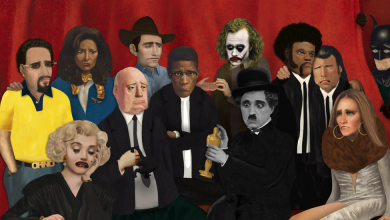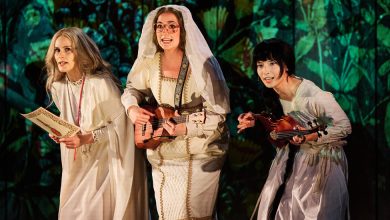Is Julio Rodríguez the Future of Baseball? He Has No Doubt.

PEORIA, Ariz. — Challenge Julio Rodríguez at your own risk. During a spring training workout here over two weeks ago, Jerry Dipoto, the Seattle Mariners president of baseball operations, did just that with the team’s 21-year-old outfield prospect.
Sitting on the bench, Rodríguez, the third-ranked prospect in the sport, turned to Dipoto and told him how much he was driven by what people said he couldn’t do. So Rodríguez, primarily a corner outfielder in the minor leagues, asked his boss if he thought Rodríguez could play center. Dipoto, a former major league pitcher, said yes and Rodríguez, smiling, reassured him that he had already worked hard to do so.
Then Dipoto needled Rodríguez. “Do you know what I don’t think you can do? I don’t think you can do 30/30 or win a triple crown,” he said referring to two unique feats — hitting 30 home runs and stealing 30 bases in a season, and leading a league in batting average, home runs and runs batted in.
“I meant it jokingly just to see where he would go,” Dipoto later recalled. “And he said, ‘You don’t think so?’ I said, ‘No, I don’t.’ Then he took back his bat and said, ‘It’s on.’ Since then, every time he is on first base, he runs.”
When the Mariners begin their 2022 season on Friday against the Minnesota Twins — a day later than expected because of rain in Minneapolis — Rodríguez is expected to be in center field, the culmination of a lifelong dream for him and his parents, who were slated to fly in from their native Dominican Republic to watch their son’s Major League Baseball debut.
It will also serve as another reminder that Rodríguez — with his big dreams and a big smile, a self-assuredness that belies his years, an aptitude for English and a body reminiscent of a football player — can achieve a lot when he sets his mind to it. This off-season, Rodríguez pushed himself to improve a skill that previously lagged behind his others — his speed — so he could handle center field. And now, Rodríguez, who is listed at 6-foot-3 and 228 pounds, is close to an elite-level runner in baseball, according to Dipoto.
“He’s a five-tool player,” Dipoto said, “who has somehow managed to make all of his tools better.”
A big challenge now awaits Rodríguez: fulfilling the hopeful promise of a new Mariners era. After years of rebuilding, Seattle won a surprising 90 games last season and was in contention for a playoff spot until the final day of the regular season. Rodríguez, though, played no part, producing a stellar 2021 in which he hit .347 with 13 home runs over two minor league levels and helped guide the Dominican baseball team to a bronze medal at the Tokyo Games.
Ever since Rodríguez was 17, the year after he signed with the Mariners for $1.75 million, he has known about the franchise’s dismal October history. In 2001, the Mariners tied a major league record by winning 116 games but flamed out in the second round of the postseason. They haven’t been back since, the longest active playoff drought in major North American professional men’s sports. They are the only active team that has not reached the World Series.




Rodríguez took to baseball at an early age with encouragement from his family in the Dominican Republic.
The M.L.B. Lockout Comes to an End
- A New Agreement: After a contentious labor dispute, the league and players’ union struck a deal that would allow a full season to be played starting April 7.
- Looking Ahead: If the end of the lockout results in a better game, the acrimony will have been worth it, our national baseball columnist writes.
- A Frayed Relationship: M.L.B.’s commissioner called the deal “an olive branch.” Could it also be the start of better relations between the league and the players?
- Lockout and Doping: The work stoppage led to the suspension of the league’s drug testing program, offering players ample time for foul play.
When Rodríguez and his father flew to Seattle last fall so he could receive a minor-league award from the Mariners before a game at T-Mobile Park, Rodríguez explained the franchise’s ignominious past.
“He said, ‘Dad, look, I want to be part of the team that breaks this record,’” his father, 53, who is also named Julio Rodríguez, said in a phone interview in Spanish. “‘We want to change Seattle’s history.’”
This, of course, has fueled the younger Rodríguez. His father always dreamed of becoming a professional baseball player but couldn’t, so he passed that desire onto his son. He put a plastic bat in his son’s hands at birth, and, by the time his son was walking, the elder Rodríguez was tossing him balls to hit in the backyard after work. By 12, he was catching bullpens and hitting higher velocity pitching.
So, like many Dominican boys, the younger Rodríguez ended up at a baseball academy in his teens. But his parents didn’t allow it until they figured out a way for their son to also complete his secondary school studies, a less common achievement among young Dominican players who focus on baseball to financially support their families. Rodríguez’s parents understood the importance of an education — his father is an agricultural engineer and his mother, Yasmin Reyes, is an odontologist.
“My parents always said, even if you’re good at baseball, it’s uncertain,” the younger Rodríguez. “Anything can happen on the field. So my parents always thought that if something did, I’d have a future off it.”
From a young age, Rodríguez said he wanted to learn English because it sounded cool. He listened to his mother’s English-for-beginners CDs. Even while he was away at a baseball academy, his parents still sent him to English classes on Saturdays. To help master colloquialisms, Rodríguez listened to Drake, following along with the rapper’s lyrics on his phone. And when he was around fellow minor leaguers from the United States, he enlisted their help.
“My English was terrible at the time,” he said. “So me not being afraid of messing up, and telling everybody around me, ‘Yo, if you hear me say something that sounds off or it’s just not so good, tell me.’ I was lucky enough that not everybody around me starting looking at me and laughing. They just opened the door.”
Rodríguez is so insistent on practicing that, even in a recent interview with another native Spanish speaker for this article, he often answered in English, seamlessly slipping between both languages. His adeptness in English stood in contrast to Kevin Mather, the former Mariners president who resigned last year after making controversial remarks about roster manipulation and the English abilities of the Japanese player Hisashi Iwakuma and Rodríguez.
“When he said that, it came through one ear and out the other,” Rodríguez said, ironically, in English. “It wasn’t really something that bothered me. I didn’t know the guy.”
On the field, Rodriguez is part of an influx of elite young talent to the majors. The Detroit Tigers and the Kansas City Royals each promoted their top prospects for opening day — first baseman Spencer Torkelson and shortstop Bobby Witt Jr. — after brief stints in Class AAA and strong spring training showings.
Each could be a result of a new incentive in the labor agreement between M.L.B. and the players’ union: To cut down on the service-time manipulation Mather once described, teams can earn an extra draft pick after the first round if a top prospect is in the major leagues his entire rookie year and finishes in either the top three in Rookie of the Year voting or the top five in the Most Valuable Player or Cy Young Award voting in any season before he reaches salary arbitration.
But Rodríguez sets himself apart from other top prospects, those around him say, with his magnetic personality. In a sport slowly shedding its reputation of traditionalism and muted individualism, Rodríguez shines. He laughs. He smiles. He doesn’t hide his emotions on the field. His batting practice bat is plastered with a nickname: JROD. He has his own logo.
“I respect people that take this so serious,” Rodríguez said about baseball. “I definitely think it’s serious. I work really hard to keep getting better and all that, but at the end of the day, you’ve got to enjoy this.”
Rodríguez isn’t shy about wanting to be an attraction. Growing up, he idolized the former Mariners star Alex Rodriguez. Julio Rodríguez admired that whenever A-Rod was batting, everyone stopped to watch. During an interview years ago, Rodríguez said the interviewer mentioned a nickname that played off his idol’s — J-Rod Show — and it stuck.
“Baseballs needs Julios,” Dipoto said. “To have someone with that kind of talent who is not afraid to go out and compete on the biggest stage — who invites the attention and doesn’t wilt when it comes — it’s an awesome combination.”
The completion of the Mariners’ rise rests not only on the shoulders of Rodríguez, but on Seattle’s other promising young players. They include shortstop J.P. Crawford, outfielder Kyle Lewis (the 2020 American League Rookie of the Year, who has been slowed by knee injuries), pitchers Matt Brash and Logan Gilbert, catcher Cal Raleigh and outfielder Jarred Kelenic (the former Mets top prospect who sputtered in his rookie season last year).
“For all those guys and all the talent that they have, Julio does bring with him a glow and the players all feel it,” Dipoto said, adding later, “I can’t wait to see what the future holds for him.”
With an active winter, the Mariners supplemented one of the youngest M.L.B. rosters by signing or trading for the following former All-Stars: pitcher Robbie Ray (the 2021 A.L. Cy Young Award winner), outfielder Jesse Winker, and infielders Adam Frazier and Eugenio Suárez. Kelenic, 22, said everyone shared the same goal: reaching the playoffs.
Rodríguez, though, takes it several steps further with his aspirations for the team — and himself.
Does he think he can be an All-Star? Does he think he can be an everyday center fielder? Does he think he can smash 500 home runs before the end of his career? How about helping the Mariners snap their playoff drought? Or winning Seattle’s first World Series? And what about that playful 30-30 season challenge from Dipoto?
Rodríguez’s answer to each question was exactly the same: “I have no doubt in my mind.”





